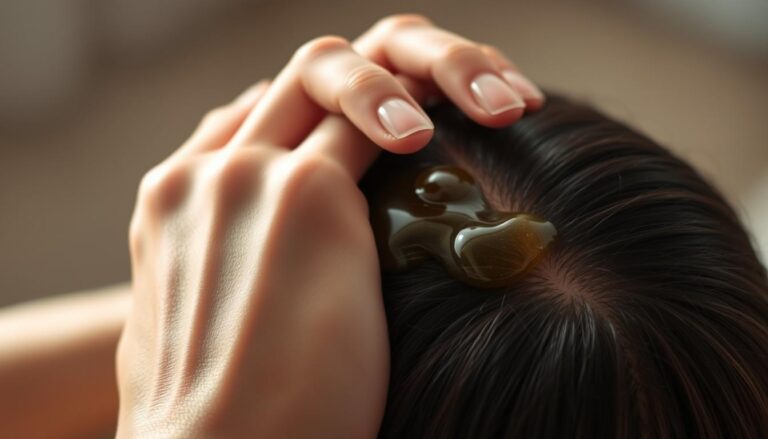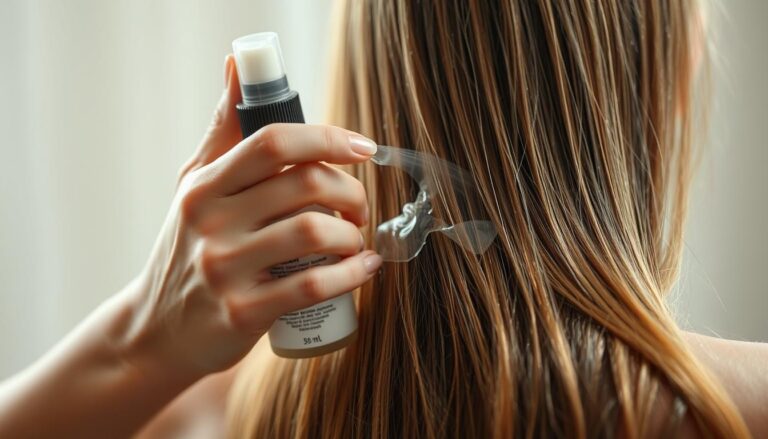At Glowskinhub.com, we believe beauty isn’t just a look—it’s a feeling

How often should you wash your hair? Complete Guide
Finding the right balance for washing your hair can be a challenge, especially for those with oily Skin. Using the best products for oily Skin can help, but understanding the frequency of washing is crucial.
Over-washing can strip the hair of its natural oils, leading to dryness, while under-washing can result in greasiness. It’s essential to consider individual factors such as lifestyle, hair type, and personal preferences when determining the ideal washing frequency.
By following oily Skin care tips and being mindful of your hair’s needs, you can achieve a healthy and balanced scalp.
Key Takeaways
- Determine your hair type to decide the washing frequency.
- Use the best products for oily Skin to maintain a healthy scalp.
- Consider your lifestyle when deciding how often to wash your hair.
- Avoid over-washing to prevent dryness.
- Be mindful of your hair’s needs to achieve a balanced scalp.
Understanding Your Hair’s Unique Needs
The key to optimal hair health lies in understanding its specific needs and responding accordingly. Your hair is as unique as you are, influenced by a combination of genetics, lifestyle, and environmental factors.
The Science Behind Clean Hair
Clean hair is not just about aesthetics; it’s also about scalp health. The scalp produces sebum, an oily substance that protects and moisturizes your hair. However, excessive sebum can lead to greasiness, while too little can cause dryness. Finding the right balance is crucial for maintaining healthy, clean hair.
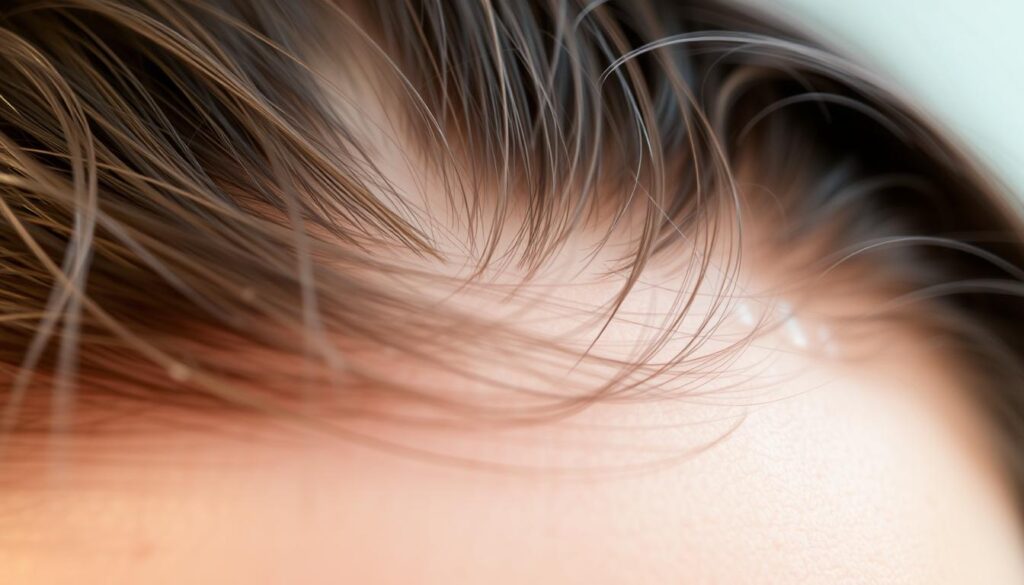
Balancing Natural Oils and Cleanliness
Achieving the perfect balance between cleanliness and preserving natural oils is vital. Over-washing can strip your hair of its natural oils, leading to dryness and potential damage. Conversely, under-washing can result in oil buildup and scalp issues. It’s about understanding your hair’s needs and adjusting your washing routine accordingly.
- Consider your hair type: oily, dry, or combination.
- Assess your lifestyle: active or sedentary.
- Take into account environmental factors: humidity, pollution.
Why One-Size-Fits-All Advice Doesn’t Work
Generic Hair Care advice often falls short because it doesn’t account for individual differences. What works for someone else may not work for you. Factors such as hair texture, scalp condition, and personal hygiene habits play a significant role in determining your ideal hair washing schedule. For instance, an oily Skin routine might require more frequent washing, whereas dry hair may need less. Similarly, skincare for oily Skin principles can be applied to understand how to manage oily scalps.
How Often Should You Wash Your Hair?
Understanding how often to wash your hair is key to achieving the perfect balance between cleanliness and preserving natural oils. The ideal frequency depends on several factors, including your hair type, scalp condition, and lifestyle.
General Guidelines by Hair Type
Different hair types have different needs when it comes to washing frequency. For instance, oily hair may require more frequent washing, while dry or curly hair may need less.
| Hair Type | Washing Frequency |
|---|---|
| Oily Hair | Daily or Every Other Day |
| Dry or Curly Hair | 2-3 Times a Week |
| Normal Hair | 2-3 Times a Week |
Listening to Your Scalp and Hair
It’s essential to pay attention to your scalp and hair’s response to your washing routine. If you notice excessive oiliness, dryness, or irritation, it may be a sign that you need to adjust your washing frequency.
Key indicators to watch out for:
- Excessive oiliness or greasiness
- Dryness or brittleness
- Irritation or itchiness on the scalp
Adjusting Your Routine Seasonally
The changing seasons can affect your hair’s needs. For example, during the summer months, you may need to wash your hair more frequently due to increased sweat and oil production.
Consider the following seasonal adjustments:
- Summer: More frequent washing due to heat and humidity
- Winter: Less frequent washing to preserve moisture
UK Climate Considerations
The UK’s temperate maritime climate means that the weather can be quite changeable. This can impact your hair’s condition and washing needs.

By considering these factors and adjusting your washing routine accordingly, you can achieve healthier and more manageable hair.
Key Factors That Determine Your Ideal Washing Schedule
Determining your ideal hair washing schedule depends on several key factors. Understanding these factors is crucial for maintaining healthy, clean hair that looks its best.
Hair Type and Texture
Your hair type and texture play a significant role in determining how often you should wash your hair. For instance, individuals with fine or thin hair may need to wash their hair more frequently than those with thicker or curlier hair. If you have an oily Skin regimen, you might also notice that your scalp produces more oil, affecting your hair’s cleanliness.
Scalp Condition
The condition of your scalp is another critical factor. If you have a scalp condition such as dandruff or eczema, you may need to adjust your washing schedule to accommodate treatments or medicated shampoos. Using an appropriate oily Skin moisturizer might also be beneficial for scalp health.

Lifestyle and Activity Level
Your lifestyle and activity level significantly impact your hair washing needs. If you’re physically active or live in a humid climate, you may need to wash your hair more frequently to keep it clean and fresh.
Environmental Factors in British Weather
The British weather, known for its variability, can also affect your hair washing schedule. During humid periods, hair may become greasier faster, while dry conditions might require less frequent washing but more moisturizing products.
| Hair Type | Ideal Washing Frequency | Additional Tips |
|---|---|---|
| Fine/Thin | Every other day | Use gentle shampoos |
| Thick/Curly | 2-3 times a week | Use moisturizing products |
| Oily | Daily or every other day | Consider an oily Skin regimen |
By considering these factors, you can create a personalized hair washing schedule that keeps your hair clean, healthy, and looking its best.
Tailored Washing Guidelines for Different Hair Types
Different hair types require unique washing guidelines to maintain optimal health. Understanding your hair’s specific needs is crucial for creating an effective washing routine.
Fine or Thin Hair
For individuals with fine or thin hair, it’s essential to strike a balance between cleanliness and preserving natural oils. Washing every other day is often recommended, but this can vary based on individual factors such as lifestyle and environmental conditions.
Using a gentle, sulfate-free shampoo can help maintain the hair’s natural moisture. Volumizing shampoos can also be beneficial for fine hair, as they help add body without weighing it down.
Thick or Coarse Hair
Thick or coarse hair typically requires less frequent washing, as it tends to be drier than finer hair types. Washing twice or thrice a week is often sufficient, but this can be adjusted based on activity level and scalp condition.
A moisturizing shampoo and conditioner are essential for managing thick or coarse hair. Deep conditioning treatments can also help keep the hair hydrated and manageable.
Curly or Textured Hair
Curly or textured hair benefits from a washing routine that preserves its natural moisture. Washing once or twice a week is common, with some individuals using a co-washing method to keep their hair moisturized.
Using a sulfate-free shampoo and a rich conditioner is crucial for curly hair. Regular deep conditioning can also help maintain the hair’s elasticity and definition.
Straight Hair
Straight hair can often be washed more frequently than other hair types, but over-washing should still be avoided. Washing every other day is a common routine, but this can be adjusted based on individual factors.
A gentle shampoo that doesn’t strip the hair of its natural oils is ideal. Using a lightweight conditioner can help keep the hair smooth without weighing it down.
Colour-Treated Hair
Colour-treated hair requires special care to maintain its colour vibrancy. Washing colour-treated hair 2-3 times a week is often recommended to prevent fading.
Protecting British Salon Colours
For those who have their hair coloured in British salons, using colour-protecting shampoos and conditioners is essential. These products help lock in the colour and moisture, keeping the hair healthy and vibrant.

Additionally, using a colour-depositing treatment once a month can help refresh the colour and keep it looking salon-fresh.
Warning Signs: Are You Washing Too Much or Too Little?
Finding the perfect hair washing frequency can be a daunting task, but recognizing the warning signs of over-washing or under-washing is crucial. Your hair’s needs can change based on various factors, including your hair type, scalp condition, and environmental factors.
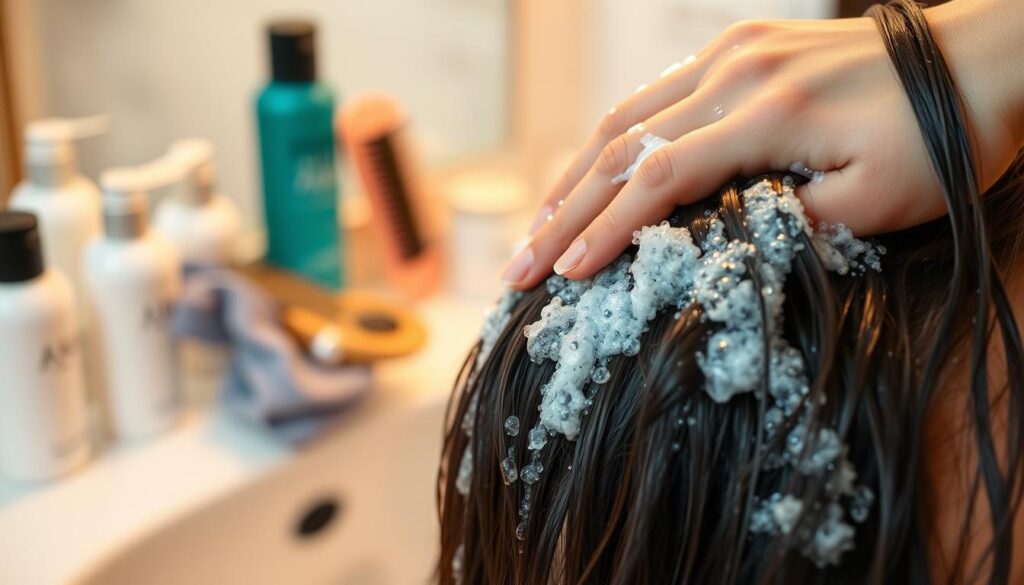
Telltale Indicators of Over-Washing
Over-washing can strip your hair of its natural oils, leading to dryness and irritation. Key signs include dryness, brittleness, and an itchy scalp. If you notice your hair feels excessively dry or looks dull, it might be a sign that you’re washing too frequently.
Clear Signs of Under-Washing
On the other hand, under-washing can cause oil buildup, leading to greasiness and potentially clogged pores. Signs of under-washing include excessive oiliness, dandruff, and a musty odor. If your hair feels constantly greasy or you notice flakes on your scalp, you might need to increase your washing frequency.
Finding Your Perfect Balance
Achieving the right balance involves understanding your hair’s specific needs. For instance, those with oily Skin might benefit from using best products for oily Skin that help control oil production without stripping the hair of its natural moisture. Adjusting your oily Skin routine according to your hair’s response is crucial.
Seasonal Adjustments for UK Weather
The UK’s weather can be quite changeable, and your hair washing schedule might need to adjust accordingly. During humid summer months, you might need to wash your hair more frequently to combat frizz and oiliness. Conversely, in dry winter months, less frequent washing can help preserve moisture.
Master the Art of Proper Hair Washing Techniques
The way you wash your hair can significantly impact its health and appearance. Proper techniques can make a substantial difference in maintaining clean, vibrant hair.
Water Temperature Matters
Water temperature plays a crucial role in hair washing. Hot water can strip your hair of its natural oils, leading to dryness and damage. On the other hand, lukewarm water is generally recommended as it effectively cleans the hair without causing excessive dryness. For those with oily hair, a cooler rinse can help in closing the cuticle and reducing oiliness.
According to Hair Care experts, using the right water temperature can significantly affect the outcome of your hair washing routine. “Using lukewarm water for washing and cooler water for rinsing can help maintain the natural balance of your hair,” says a renowned trichologist.
Application Methods for Different Hair Types
Different hair types require different application methods when it comes to washing. For instance, fine or thin hair benefits from a gentle, massaging application of shampoo directly to the scalp. In contrast, thicker or curlier hair may require a more generous application of shampoo and a gentler washing technique to avoid tangling.
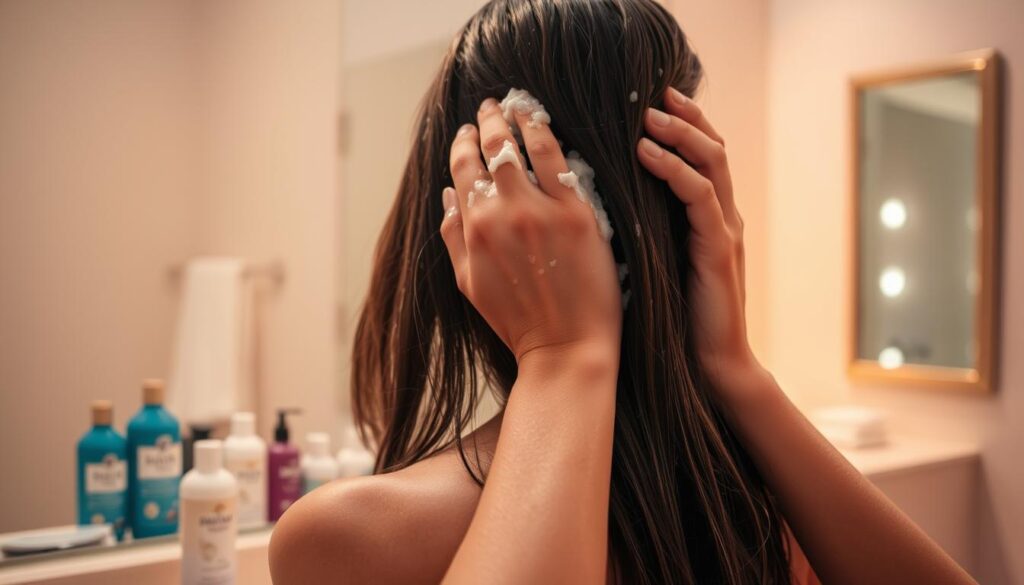
Scalp Massage Benefits and Techniques
Scalp massage during washing can increase blood flow to the scalp, promoting healthy hair growth. Massaging in circular motions with your fingertips can help remove dirt and stimulate the scalp. This technique is beneficial for all hair types and can be adapted based on individual scalp conditions.
Rinsing Thoroughly in Hard Water Areas
Rinsing your hair thoroughly is crucial, especially in areas with hard water. Hard water contains minerals that can affect hair health. A thorough rinse can help remove these minerals and prevent buildup.
Managing UK’s Hard Water Challenges
The UK is known for its hard water, which can pose challenges for Hair Care. Using a water filter or a clarifying shampoo can help mitigate the effects of hard water on hair. Regular use of such products can keep your hair cleaner for longer and reduce the risk of mineral buildup.
By mastering these hair washing techniques, you can significantly improve the health and appearance of your hair, regardless of your hair type or the water quality in your area.
Choosing Products That Complement Your Washing Schedule
Once you’ve determined your ideal hair washing schedule, it’s essential to select products that complement it. The right products can enhance your hair’s health, texture, and appearance, while the wrong ones can lead to issues like dryness, oiliness, or damage.
Selecting the Right Shampoo for Your Needs
Choosing the right shampoo is crucial for maintaining healthy hair. For those with oily Skin or scalp conditions, a gentle, sulfate-free shampoo can help regulate oil production without stripping the hair of its natural oils. When selecting a shampoo, consider your hair type and specific needs, such as moisturizing, volumizing, or color protection.
For instance, if you have fine or thin hair, a lightweight, non-greasy shampoo can help add volume without weighing your hair down. On the other hand, if you have dry or damaged hair, a moisturizing shampoo with ingredients like argan oil or shea butter can provide the necessary hydration.

Conditioners and Hair Masks for British Hair Types
Conditioners and hair masks play a vital role in maintaining hair health, especially in the UK’s often humid and unpredictable climate. A good conditioner can help detangle hair, reduce frizz, and add shine. For British hair types, which often range from fine to curly, a conditioner that provides moisture and nourishment is essential.
Hair masks can provide an intense dose of hydration or repair, depending on your hair’s needs. For example, a hair mask containing coconut oil or keratin can help repair damaged hair, while a mask with tea tree oil can help soothe a dry scalp.
Dry Shampoo: When and How to Use It Properly
Dry shampoo can be a lifesaver on busy days or between washes, absorbing excess oil and adding texture to hair. However, it’s essential to use it correctly to avoid product buildup or dryness. When using dry shampoo, spray it at the roots, massage it in, and brush out any excess to prevent visible residue.
Scalp Treatments for Common UK Hair Concerns
Scalp treatments can address specific hair concerns, such as dandruff, itchiness, or flakiness. In the UK, where scalp issues can be exacerbated by the climate, a scalp treatment containing ingredients like salicylic acid or tea tree oil can help soothe and calm the scalp.
By choosing the right products for your washing schedule and hair type, you can maintain healthy, beautiful hair that looks its best in any condition.
Expert Advice from Top UK Trichologists and Stylists
Expert trichologists in the UK provide guidance on creating a personalized hair washing routine. With their extensive knowledge, they help individuals understand the intricacies of Hair Care.
What British Hair Experts Recommend
British hair experts emphasize the importance of understanding one’s hair type and scalp condition. They recommend using suitable shampoos and conditioners that cater to specific hair needs, such as oily Skin care tips that include using gentle cleansers.
Salon vs. Home Care Washing Routines
While salon treatments offer professional care, maintaining a consistent home care routine is crucial. Trichologists suggest that a balanced approach between salon visits and home care can lead to healthier hair.
Professional Solutions for Washing-Related Hair Problems
Trichologists often recommend specialized treatments for common issues like dandruff or excessive oiliness. For instance, using an oily Skin moisturizer might seem counterintuitive, but certain products can help regulate oil production.
When to Seek Expert Help
If you’re experiencing persistent hair or scalp issues, it’s advisable to seek help from a professional trichologist or stylist. They can provide personalized advice and treatments tailored to your specific hair concerns.
Troubleshooting Common Hair Washing Issues
Understanding how to troubleshoot common hair washing problems is crucial for maintaining healthy hair. Hair washing can be a complex process, and various factors can affect the outcome.
Dealing with Persistent Greasiness
Persistent greasiness can be a frustrating issue. It may be due to over-production of sebum or using the wrong Hair Care products. To combat this, consider using a clarifying shampoo specifically designed for oily hair. Additionally, incorporating an oily Skin treatment into your routine can help regulate oil production.
Combating Dryness and Frizz
Dryness and frizz can be caused by over-washing or using harsh hair products. To address this, use a moisturizing shampoo and conditioner suitable for your hair type. Regular use of a hair mask can also help to lock in moisture and reduce frizz.
Managing Dandruff and Scalp Conditions
Dandruff and other scalp conditions can be managed by using anti-dandruff shampoos containing ingredients like zinc pyrithione or ketoconazole. Regular scalp massages can also improve scalp health by increasing blood circulation.
Adjusting to New Products or Routines
When adjusting to new Hair Care products or routines, it’s essential to gradually introduce new products to avoid shocking your hair. Start with a small amount and monitor your hair’s response.
Transitioning to Natural or Sulphate-Free Products
Transitioning to natural or sulphate-free products can be beneficial for those with sensitive scalps or hair. Begin by replacing one product at a time and observe how your hair reacts. This gradual approach can help minimize potential adverse reactions.
Conclusion: Creating Your Personalised Hair Washing Routine
Now that you’ve discovered the factors that influence your hair’s washing needs, it’s time to create a personalised routine. Just as you might follow a skincare for oily Skin routine to keep your complexion balanced, your Hair Care routine should be tailored to your unique hair type, lifestyle, and environmental conditions.
By understanding your hair’s texture, scalp condition, and daily activities, you can determine the ideal washing frequency. For instance, if you have an oily Skin routine in place, you may find that your scalp also produces more oil, requiring more frequent washing.
Experiment with different washing schedules and products until you find what works best for you. Be mindful of seasonal changes and adjust your routine accordingly. With a little patience and trial, you’ll be on your way to achieving healthy, vibrant locks that look great every day.

